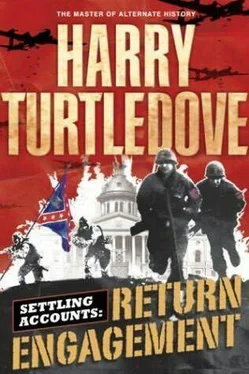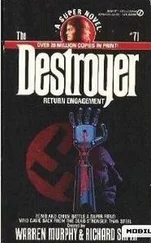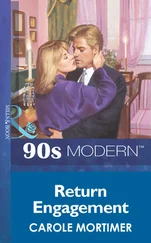Harry Turtledove - Return engagement
Здесь есть возможность читать онлайн «Harry Turtledove - Return engagement» весь текст электронной книги совершенно бесплатно (целиком полную версию без сокращений). В некоторых случаях можно слушать аудио, скачать через торрент в формате fb2 и присутствует краткое содержание. Жанр: История, на английском языке. Описание произведения, (предисловие) а так же отзывы посетителей доступны на портале библиотеки ЛибКат.
- Название:Return engagement
- Автор:
- Жанр:
- Год:неизвестен
- ISBN:нет данных
- Рейтинг книги:5 / 5. Голосов: 1
-
Избранное:Добавить в избранное
- Отзывы:
-
Ваша оценка:
- 100
- 1
- 2
- 3
- 4
- 5
Return engagement: краткое содержание, описание и аннотация
Предлагаем к чтению аннотацию, описание, краткое содержание или предисловие (зависит от того, что написал сам автор книги «Return engagement»). Если вы не нашли необходимую информацию о книге — напишите в комментариях, мы постараемся отыскать её.
Return engagement — читать онлайн бесплатно полную книгу (весь текст) целиком
Ниже представлен текст книги, разбитый по страницам. Система сохранения места последней прочитанной страницы, позволяет с удобством читать онлайн бесплатно книгу «Return engagement», без необходимости каждый раз заново искать на чём Вы остановились. Поставьте закладку, и сможете в любой момент перейти на страницу, на которой закончили чтение.
Интервал:
Закладка:
"Yes." Litvinoff looked down at himself. He seemed to realize for the first time that he was bleeding. The damage wasn't serious, but at the moment he was unequipped to do anything about it.
Dowling plucked a handkerchief from his own trouser pocket and dabbed at the younger man's nose and at his cut ear. "That's definitely a wound, Captain. I'll write you up for a Purple Heart."
"A Purple Heart? Me?" That needed a while to penetrate, too. Dowling suspected Litvinoff's likely concussion was only part of the reason. The gas specialist had done most of his work at the War Department offices back in Philadelphia. Thinking of himself as a front-line soldier wouldn't seem easy or natural. Slowly, a smile spread across his face as the idea sank in. "That will impress people, won't it?"
"Provided you live long enough to show off your pretty medal, yes," Dowling answered. "I'll be damned if I know how good your chances are, though."
As if to underscore his words, Confederate shells began landing a few hundred yards away. The bursts walked closer. "No special weapons in any of those," Captain Litvinoff said distinctly. Concussed or not, he still knew his main business.
"Happy day," Dowling said. "They can kill us anyway, you know." Litvinoff looked astonished again. That hadn't occurred to him, either. Abner Dowling wished it hadn't occurred to him.
Properly speaking, Armstrong Grimes hadn't had enough training to go into combat. After the Confederates bombed Camp Custer, nobody seemed to worry about anything like that. He had a uniform. They gave him a Springfield all his own. True, he was still missing some of the finer points of the soldier's art. The theory seemed to be that he could pick those up later. If he lived.
Getting bombed had gone a long way toward clearing notions of immortality from his head. The first bullet that cracked past his head missed him but slew several more illusions. Bombs fell out of the sky, the way rain or snow did. That bullet had been different. That bullet had been personal. He'd dug his foxhole deeper as soon as it flew by.
West Jefferson, the town he and his fellow frightened foot soldiers were supposed to defend, lay about fifteen miles west of Columbus. It was on the south bank of Little Darby Creek, and had probably been a nice place to live before the Confederates started shelling it. Brick houses from the nineteenth century stood side by side with modern frame homes. When shells hit the brick houses, they crumbled to rubble. When shells hit the frame homes, they started to burn. Six of one, half a dozen of the other, as far as Armstrong could see.
Up ahead, something that might have been a man in a butternut uniform moved. Armstrong Grimes still had a lot to learn about being a soldier, but he understood shooting first and asking questions later. He raised the Springfield to his shoulder, fired, worked the bolt, and fired again.
Maybe he'd hit the Confederate soldier. Maybe the fellow flattened out and took cover. Or maybe there hadn't been a Confederate soldier in those bushes to begin with. Any which way, Armstrong saw no more movement. That suited him fine.
His company commander was a pinch-faced, redheaded captain with acne scars named Gilbert Boyle. "Keep your peckers up, boys!" Boyle called. "We've got to make sure Featherston's fuckers don't ford the creek."
A corporal named Rex Stowe crouched in a foxhole about ten feet from Armstrong's. He was swarthy, unshaven, and cynical. A cigarette dangled from one corner of his mouth. It jerked up and down as he said, "Yeah, keep your pecker up. That way, Featherston's fuckers can shoot it off you easier."
The mere thought made Armstrong want to drop his rifle and clutch himself right there. He'd seen a lot of horrible things since the war started. He hadn't seen that yet, for which he thanked the God in Whom he believed maybe one morning in four.
A submachine gun stuttered, somewhere not far away. Bullets stitched up dirt and grass in front of Armstrong. Then, when the burst went high the way they always did, more rounds clipped twigs from the willow tree behind him. He tried to disappear into his foxhole. It wasn't big enough for that, but he did his damnedest.
Stowe fired a couple of times in the direction from which the burst had come. More submachine-gun fire answered him. He curled up in his hole, too. "I think everybody in the whole goddamn Confederate Army carries an automatic weapon," he growled, a mixture of disgust and fear in his voice.
"Seems that way," Armstrong agreed. "There's always more of us, but they put more lead in the air."
After another burst of fire, this from a new direction, a Southern voice called, "You Yankees! y'all surrender now, get yourselves out o' the fight, make sure y'all live through the war!"
"No," Captain Boyle shouted back, and then, "Hell, no! You want us, you come get us. It won't be as easy as you think."
"You'll be sorry, Yank," the Confederate answered. "Sure you don't want to change your mind?… Going once… Going twice… Gone! All right, you asked for it, and now you'll get it."
Armstrong's father went on and on about Confederate attacks during the Great War, about artillery barrages and then thousands of men in butternut struggling through barbed wire toward waiting machine guns and riflemen. Merle Grimes had a Purple Heart and walked with a cane. Armstrong thought he was a blowhard, but he'd never figured his old man didn't know what he was talking about.
These Confederates, though, had a different set of rules-or maybe just a different set of tools. Instead of an infantry charge to clear the U.S. soldiers out of West Jefferson, four barrels rattled forward.
Foot soldiers ran along with the machines, but Armstrong hardly noticed them. He started shooting at the lead barrel. His bullets threw off sparks as they ricocheted from the frontal armor. For all the harm they did, he might as well have been throwing peaches.
"Where's our barrels?" he shouted. It was, he thought, a hell of a good question, but no one answered it.
Behind an oak tree, three artillerymen struggled to make a 1.5-inch antibarrel gun bear on the Confederate machines. "Fire!" yelled the sergeant in charge of the gun. The shell exploded between two of the barrels. The gun crew reloaded. The sergeant shouted, "Fire!" again. This time, they scored a hit. As flame and smoke spurted from a barrel, the artillerymen whooped in delight.
They didn't enjoy their triumph long. Two of the surviving barrels turned their machine guns and cannon fire on them. The splinter shield on their piece wasn't big enough to protect them. Down they went, one after another. Armstrong didn't know what artillerymen learned while they trained. Whatever it was, it didn't include much about taking cover. Shell fragments hissed and squealed through the air, right past his head. He sure as hell ducked.
On came the three remaining Confederate barrels. They looked as big as houses to Armstrong. The soldiers who advanced with them also shot and shot and shot, making the U.S. defenders keep their heads down. Some of the C.S. foot soldiers carried submachine guns. Others had automatic rifles, which were even nastier weapons. Submachine guns fired pistol cartridges of limited range and hitting power. But an automatic rifle with a round as powerful as a Springfield's… that was very nasty news indeed.
"Hang tough, men!" Captain Boyle shouted. "We can stop them!"
The Confederate barrels shelled the houses on the south side of town. They knocked down a couple of them and started several new fires. Coughing at the smoke, Armstrong didn't think they accomplished much else.
In spite of Captain Boyle's commands, U.S. soldiers started slipping back towards and over Little Darby Creek. West Jefferson didn't seem worth dying for. Facing barrels and infantrymen with automatic weapons when they had none of their own looked like a bad bargain to more and more men.
Читать дальшеИнтервал:
Закладка:
Похожие книги на «Return engagement»
Представляем Вашему вниманию похожие книги на «Return engagement» списком для выбора. Мы отобрали схожую по названию и смыслу литературу в надежде предоставить читателям больше вариантов отыскать новые, интересные, ещё непрочитанные произведения.
Обсуждение, отзывы о книге «Return engagement» и просто собственные мнения читателей. Оставьте ваши комментарии, напишите, что Вы думаете о произведении, его смысле или главных героях. Укажите что конкретно понравилось, а что нет, и почему Вы так считаете.












